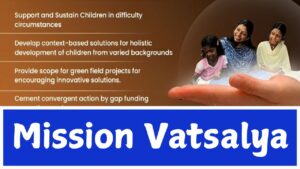Mission Vatsalya
1. Overview of Mission Vatsalya
- A centrally sponsored child protection initiative, implemented in Karnataka from the 2022–23 fiscal year, under the Integrated Child Protection Scheme (ICPS) (wcd.karnataka.gov.in).
- Supports children in “difficult circumstances”—orphans, fatherless, with incarcerated parents, single-parent situations, disability, trafficking, abuse, child labour, disaster-affected, street-connected, and children of sex workers/devadasis .

2. Financial Assistance: ₹4,000/month
- Beneficiaries receive ₹4,000 per month via DBT, totaling ₹48,000 annually, starting April 1, 2022 (pmcaresforchildren.in).
- Covers both institutional care (homes, shelters) and non-institutional care (sponsorship, foster care) (scribd.com).
3. Eligibility
- Children under 18 years fitting any of these criteria:
- Orphans, fatherless, single-parent families
- With incarcerated parents, victims of abuse, trafficking, labour, disability
- From disadvantaged backgrounds—devadasi, sex workers, disaster-hit, street-connected (sansad.in).
4. Application & Approval Process
- Apply offline only, at the District Child Protection Unit (DCPU) or Taluka Child Development Project Office (scribd.com).
- Applications are reviewed by the District Magistrate and Child Welfare Committee (CWC).
- A home visit is mandatory to verify eligibility and living conditions (scribd.com).
5. Required Documents
- Birth certificate, death certificate/divorce/abandonment proof
- Income & caste certificate (subject to state ceiling)
- Disability/medical certificate (if applicable), school register proof
- Aadhaar for child and guardian, bank passbook, passport-sized photo (sansad.in).
6. Institutional Structure & Governance
- Financial support is on a 60% Centre / 40% State funding model (pmcaresforchildren.in).
- Central oversight by MWCD through the Mission Vatsalya Project Approval Board (scribd.com).
- State-level coordination by WCD’s State Child Protection Society and Child Welfare Committee (scribd.com).
- District-level: DM and DCPU enforce and monitor GR processes and beneficiary check-ins (scribd.com).
7. Non-Institutional Care Options
- Sponsorship & Foster Care: Additional support-with care in everyday home settings, benefiting thousands since 2013‑14 (wcdhry.gov.in).
- As of 2024–25, Karnataka supports 6,452 children (6,122 via sponsorship; 330 via foster care) receiving ₹4,000 monthly (wcdhry.gov.in).
- After-care: Aid for youths who age out of institutions, offering ₹4,000/month during transition (wcdhry.gov.in).
8. Institutional Care Overview
- Karnataka has 154 Child Care Institutions (CCIs) funded under Mission Vatsalya (as of March 2023) (sansad.in).
- CCIs provide boarding, education, health services, counseling, and vocational training, following JJ Act standards (sansad.in).
9. Comprehensive Support Beyond Stipend
- Legal Assistance: CWCs & JJBs under the Juvenile Justice Act, integrated with Mission Vatsalya (wcdhry.gov.in).
- Education & Health:
- School enrollment, 20,000 annual scholarship for Classes I–XII under PM CARES for Children (sansad.in).
- Admission support in KVs, KGBVs, or private schools .
- Assistance for higher education loans, interest borne by PM-CARES (sansad.in).
- Ayushman Bharat health insurance (₹5 lakh) until age 23 (sansad.in).
- Swanath Scholarship (₹50,000/year) for AICTE courses, plus vocational training initiatives (sansad.in).
10. Karnataka’s Beneficiary Snapshot
- Under PM CARES (father-deceased COVID cases), 231 children in Karnataka received support as of August 2023 .
- For school scholars (Classes I–XII), 205 children in Karnataka were eligible under PM CARES scheme (pib.gov.in).
11. Key Timelines
- Scheme approved: April 1, 2022 (Mission Vatsalya financial norms begin) (cara.wcd.gov.in).
- Karnataka implementation: FY 2022–23 onwards (sansad.in).
12. Next Steps for Applicants in Karnataka
- Visit the local DCPU or Taluka Child Development Office, ask for forms.
- Gather documents: birth, parental status, income, identity, proof of school, etc.
- Submit offline, then schedule a home verification.
- After approval, DBT stipend starts within weeks.
- Also ask about non-institutional options (sponsorship, foster, after-care).
Need specific help?
Would you like me to help find the contact details, phone numbers, or address of the District Child Protection Office in Bengaluru or your district? Let me know—happy to assist!
